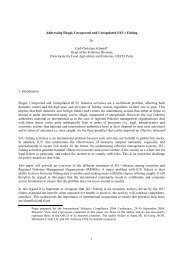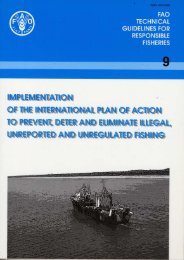Fishing Vessel Monitoring Systems: Past, Present and Future
Fishing Vessel Monitoring Systems: Past, Present and Future
Fishing Vessel Monitoring Systems: Past, Present and Future
Create successful ePaper yourself
Turn your PDF publications into a flip-book with our unique Google optimized e-Paper software.
VMS: <strong>Past</strong>, <strong>Present</strong> <strong>and</strong> <strong>Future</strong> 31<br />
5.0 VMS <strong>and</strong> international cooperation/best practice use of VMS<br />
The use of VMS has been declared an unqualified success by virtually all of the<br />
fisheries protection <strong>and</strong> compliance agencies that have put it into place. It has<br />
provided a useful means of regulating national fisheries as well as monitoring flag<br />
vessels when they are operating in international waters or in the EEZ of a<br />
different coastal state. On the national level, therefore, VMS is of sufficient<br />
maturity to offer something akin to its optimal functionality, even if the level of<br />
data analysis in many countries remains relatively limited.<br />
Simple as is VMS technology <strong>and</strong> the corresponding implementation of a working<br />
system, getting the most of fishing vessel tracking requires a solid conceptual<br />
approach related to the fisheries in which it is going to be used. This is a precondition<br />
for effectively establishing a context of international cooperation <strong>and</strong><br />
remains a first priority is to assure that the benefit received from the effort <strong>and</strong><br />
investment of putting a VMS into place be justified.<br />
Furthermore, the establishment of a VMS cannot be done in isolation <strong>and</strong> implies<br />
a number of responsibilities for the government entity with regard to its<br />
governmental colleagues, its fishing industry <strong>and</strong> often its regional neighbours.<br />
It is convenient to use four macro-categories to define the issues that must be<br />
addressed if a VMS were to be considered optimal: technical integrity, security,<br />
data access <strong>and</strong> distribution <strong>and</strong> the legal <strong>and</strong> administrative framework. Each of<br />
these issues should be addressed individually.<br />
5.1 Technical integrity<br />
This is the starting point for any VMS. Before any technical specifications can be<br />
defined, it is essential to ask a number of fundamental questions, such as which<br />
fisheries can benefit from a VMS <strong>and</strong> precisely how the operations of those<br />
fisheries will be enhanced by gathering real-time data on vessel movements.<br />
In many existing VMS implementations, these questions have been avoided in<br />
favour of an across-the-board implementation based upon vessel size. The<br />
overriding principle here is that the larger the vessel, the greater the effort <strong>and</strong>,<br />
therefore, the more pressing the requirement for VMS.<br />
Whilst this reasoning is not completely erroneous, it does, however, lack a<br />
certain subtlety in that it fails to take into account the actual “sensitivity” of a<br />
given fishery. Sensitivity might be characterised as a less-than-purely-scientific<br />
measure of the economic importance <strong>and</strong> inherent precariousness of a given<br />
fishery. Relatively small vessels fishing threatened stocks of key species in<br />
breeding areas might, for example, require closer scrutiny than very large<br />
vessels fishing healthy stocks on the high seas.

















